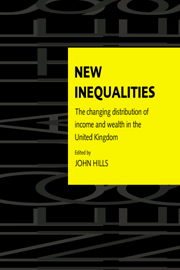Book contents
- Frontmatter
- Contents
- List of figures
- List of tables
- List of contributors
- Acknowledgements
- 1 Introduction: after the turning point
- Part I Income distribution
- Part II Components of income
- 6 What has happened to the wages of men since 1966?
- 7 Women's pay and family incomes in Britain, 1979–91
- 8 More work in fewer households?
- 9 Self-employment and the distribution of income
- 10 Fairer or Fowler? The effects of the 1986 Social Security Act on family incomes
- Part III Spatial aspects
- Part IV Income and wealth
- Bibliography
- Index
10 - Fairer or Fowler? The effects of the 1986 Social Security Act on family incomes
from Part II - Components of income
Published online by Cambridge University Press: 22 September 2009
- Frontmatter
- Contents
- List of figures
- List of tables
- List of contributors
- Acknowledgements
- 1 Introduction: after the turning point
- Part I Income distribution
- Part II Components of income
- 6 What has happened to the wages of men since 1966?
- 7 Women's pay and family incomes in Britain, 1979–91
- 8 More work in fewer households?
- 9 Self-employment and the distribution of income
- 10 Fairer or Fowler? The effects of the 1986 Social Security Act on family incomes
- Part III Spatial aspects
- Part IV Income and wealth
- Bibliography
- Index
Summary
Introduction
This chapter summarises research into the changes to British means-tested benefits introduced by the 1986 Social Security Act. Greater detail of the research and other results can be found in Evans (1994) and Evans et al. (1994). First, I briefly outline the aims of the Act and the benefit regime it introduced. Second, I outline changing levels of government spending and the evidence of changing claimant income profiles. Last, I compare the preceding scheme to the one introduced by the Act, using the results from a micro-simulation model. The old system of means-tested benefits is modelled and brought forward and run alongside a similar model of the new scheme for the most recent year of the period studied, 1990–91. All discussion is focused on the four years between March 1987 and April 1991.
The policy changes
The old regime
The Supplementary Benefit (SB) system was a national means-tested assistance programme which had existed in some form since the mid-1930s. The SB system in the 1960s and 1970s had been amended to reduce stigma and to provide greater legal rights to entitlement. However, these changes had not altered SB's individualised assessment of needs, and this level of detailed enquiry did not allow easy administration for the 4.9 million claimants who claimed it in 1987.
Family Income Supplement (FIS) was a means-tested benefit for families with children in low paid work introduced in 1971.
- Type
- Chapter
- Information
- New InequalitiesThe Changing Distribution of Income and Wealth in the United Kingdom, pp. 236 - 262Publisher: Cambridge University PressPrint publication year: 1996
- 1
- Cited by



